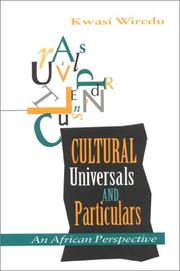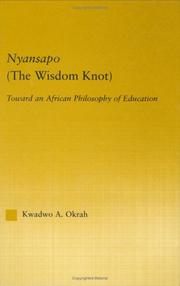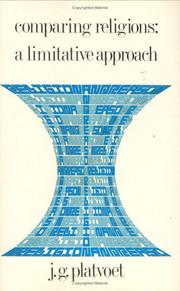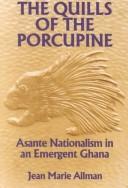| Listing 1 - 10 of 13 | << page >> |
Sort by
|

ISBN: 0585001375 9780585001371 0253332095 0253210801 9780253332097 9780253210807 Year: 1996 Publisher: Bloomington Indiana University Press
Abstract | Keywords | Export | Availability | Bookmark
 Loading...
Loading...Choose an application
- Reference Manager
- EndNote
- RefWorks (Direct export to RefWorks)
"Wiredu's discussion of culturally defined values and concepts, as well as his attention to such timely issues as human rights, makes this book invaluable interdisciplinary reading." --D. A. MasoloGhanaian philosopher Kwasi Wiredu confronts the paradox that while Western cultures recoil from claims of universality, previously colonized peoples, seeking to redefine their identities, insist on cultural particularities. Wiredu asserts that universals, rightly conceived on the basis of our common biological identity, are not incompatible with cultural particularities and, in fact, are what make intercultural communication possible. Drawing on aspects of Akan thought that appear to diverge from Western conceptions in the areas of ethics and metaphysics, Wiredu calls for a just reappraisal of these disparities, free of thought patterns corrupted by a colonial mentality. Wiredu's exposition of the principles of African traditional philosophy is not purely theoretical; he shows how certain aspects of African political thought may be applied to the practical resolution of some of Africa's most pressing problems.
Akan (African People) --- Philosophy, African --- Universalism --- Social Science --- Philosophy --- Religion --- Akan (african people) --- Philosophy, african --- Social science
Book
ISBN: 1782385614 Year: 2015 Publisher: New York, [New York] ; Oxford, [England] : Berghahn Books,
Abstract | Keywords | Export | Availability | Bookmark
 Loading...
Loading...Choose an application
- Reference Manager
- EndNote
- RefWorks (Direct export to RefWorks)
Witchcraft violence is a feature of many contemporary African societies. In Ghana, belief in witchcraft and the malignant activities of putative witches is prevalent. Purported witches are blamed for all manner of adversities including inexplicable illnesses and untimely deaths. As in other historical periods and other societies, in contemporary Ghana, alleged witches are typically female, elderly, poor, and marginalized. Childhood socialization in homes and schools, exposure to mass media, and other institutional mechanisms ensure that witchcraft beliefs are transmitted across generations and entrenched over time. This book provides a detailed account of Ghanaian witchcraft beliefs and practices and their role in fueling violent attacks on alleged witches by aggrieved individuals and vigilante groups.
Witchcraft --- Witches --- Trials (Witchcraft) --- Sexism in witchcraft trials --- Akan (African people) --- Social aspects --- Violence against. --- Social conditions.
Book
ISBN: 0761868453 9780761868453 0761868445 9780761868446 Year: 2017 Publisher: Lanham Hamilton Books, an imprint of Rowman & Littlefield
Abstract | Keywords | Export | Availability | Bookmark
 Loading...
Loading...Choose an application
- Reference Manager
- EndNote
- RefWorks (Direct export to RefWorks)
Akan (African people) --- Religion. --- Ghana --- Côte d'Ivoire --- Côte d'Ivoire. --- Ghana. --- Religious life and customs.

ISBN: 0585231885 9780585231884 0253368014 0253209463 9780253368010 9780253209467 Year: 1995 Publisher: Bloomington, Ind. Indiana University Press
Abstract | Keywords | Export | Availability | Bookmark
 Loading...
Loading...Choose an application
- Reference Manager
- EndNote
- RefWorks (Direct export to RefWorks)
Provides an ethnography of royal rhetoric and the language and politics of representation among the Akan of Ghana. This book shows the connections between verbal strategies and the cultural organization of West African social systems. It shows the art of the okyeame to be not simply a genre of speaking, but a set of cultural practices.
AKAN (AFRICAN PEOPLE) --- SPEECHES, ADDRESSES, ETC. --- NEGOTIATION --- ORAL TRADITION --- GHANA --- SOCIAL SCIENCE --- LITERARY COLLECTIONS --- LANGUAGE ARTS & DISCIPLINES --- Akan (African People) --- Speeches, Addresses, Etc. --- Negotiation --- Oral Tradition --- Ghana --- Social Science --- Literary Collections --- Language Arts & Disciplines --- Akan (african people) --- Speeches, addresses, etc. --- Oral tradition --- Social science --- Literary collections --- Language arts & disciplines

ISBN: 1135938024 0415861098 128005932X 0203463897 9780203463895 0415947332 9781135937973 9781135938017 9781135938024 9780415947336 9780415861090 1135938016 Year: 2003 Publisher: New York Routledge
Abstract | Keywords | Export | Availability | Bookmark
 Loading...
Loading...Choose an application
- Reference Manager
- EndNote
- RefWorks (Direct export to RefWorks)
This study examines the issues of indigenous philosophies, which are embedded in different aspects of the socialization process among the Akan of Ghana.
Akan (African people) --- Philosophy, Akan. --- Education --- Akan philosophy --- Akans (African people) --- Twi Fante (African people) --- Ethnology --- Fanti (African people) --- Education. --- Philosophy.

ISBN: 1474470823 0748672737 0585443890 9780585443898 0253214963 9780253214966 0253340306 9780253340306 0748615105 9780748615100 9781474470827 9780748672738 Year: 2000 Publisher: London Bloomington
Abstract | Keywords | Export | Availability | Bookmark
 Loading...
Loading...Choose an application
- Reference Manager
- EndNote
- RefWorks (Direct export to RefWorks)
GBS_insertPreviewButtonPopup('ISBN:9780748615100);Asante Identitiesis an account of life in the Asante village of Ade beba in West Africa during a century of rapid change, told as far as possible in the words of the villagers themselves. Asante is the most intensely studied of all sub-Saharan African cultures, and this book takes Asante and African historiography to new levels of reconstruction , analysis and understanding. This is the most closely focused historical study thus far achieved of African people engaging with issues of selfhood, identity and agency in an era that saw the continent fall under European domination.Key FeaturesMajor contribution to African studies in its historical depth and analytic sophisticationA book of wider interest to non-Africanist historians, social scientists and othersConsiders issues of broad and current concern never before studied at this levelAsante Identities is a volume in the International African Library, a major monograph series from the International African Institute which complements its quarterly periodical Africa, the premier journal in the field of African Studies."
Ashanti (African people) --- Achanti (African people) --- Asante (African people) --- Asanti (African people) --- Ashante Twi (African people) --- Ashantee (African people) --- Ashantis (African people) --- Akan (African people) --- Ethnology --- History. --- Social life and customs. --- Adeeba (Ghana)
Book
ISBN: 9782015237 9791092312690 Year: 1993 Publisher: Ibadan Paris IFRA KARTHALA
Abstract | Keywords | Export | Availability | Bookmark
 Loading...
Loading...Choose an application
- Reference Manager
- EndNote
- RefWorks (Direct export to RefWorks)
undefined
Ghana --- History --- To 1957 --- Social life and customs --- Akan (African people) --- Efutu (African people) --- Social life and customs. --- Afutu (African people) --- Awutu (African people) --- Effutu (African people) --- Fetu (African people) --- Futu (African people) --- Ethnology --- Akan --- Fetu --- commerce atlantique

ISBN: 9027931704 3110821818 9783110821819 9789027931702 Year: 1982 Volume: 24 Publisher: The Hague New York Mouton Publishers
Abstract | Keywords | Export | Availability | Bookmark
 Loading...
Loading...Choose an application
- Reference Manager
- EndNote
- RefWorks (Direct export to RefWorks)
Sinceits founding by Jacques Waardenburg in 1971, Religion and Reason has been a leading forum for contributions on theories, theoretical issues and agendas related to the phenomenon and the study of religion. Topics include (among others) category formation, comparison, ethnophilosophy, hermeneutics, methodology, myth, phenomenology, philosophy of science, scientific atheism, structuralism, and theories of religion. From time to time the series publishes volumes that map the state of the art and the history of the discipline.
Akans (African people) --- IFO-Sananda (Religious group) --- Para (Surinam) --- Para (Suriname) --- -Negroes --- Twi Fante (African people) --- Fanti (African people) --- -Godsdienstwetenschap: vergelijkend --- IFO-Sananda (Religious group). --- -Comparative religion --- Akan (African people) --- Blacks --- Religions --- 291 --- Comparative religion --- Denominations, Religious --- Religion, Comparative --- Religions, Comparative --- Religious denominations --- World religions --- Civilization --- Gods --- Religion --- Negroes --- Ethnology --- Godsdienstwetenschap: vergelijkend --- District Para (Suriname) --- Religion. --- Religions. --- Black persons --- Black people --- Akan (African people) - Religion --- Blacks - Suriname - Para - Religion --- Para (Suriname) - Religion

ISBN: 0585176159 9780585176154 9780299137632 0299137635 9780299137649 0299137600 0299137643 9780299137601 1282424041 9781282424043 9786612424045 6612424044 Year: 1993 Publisher: Madison, Wis.
Abstract | Keywords | Export | Availability | Bookmark
 Loading...
Loading...Choose an application
- Reference Manager
- EndNote
- RefWorks (Direct export to RefWorks)
Ashanti (African people) --- Nationalism --- Consciousness, National --- Identity, National --- National consciousness --- National identity --- International relations --- Patriotism --- Political science --- Autonomy and independence movements --- Internationalism --- Political messianism --- Achanti (African people) --- Asante (African people) --- Asanti (African people) --- Ashante Twi (African people) --- Ashantee (African people) --- Ashantis (African people) --- Akan (African people) --- Ethnology --- Politics and government. --- History --- Ashanti Region (Ghana) --- Ghana --- Ashanti (Ghana) --- Autonomy and independence movements. --- Politics and government
Book
ISBN: 9781563686320 1563686325 9781563686337 1563686333 Year: 2015 Publisher: Washington, DC Gallaudet University Press
Abstract | Keywords | Export | Availability | Bookmark
 Loading...
Loading...Choose an application
- Reference Manager
- EndNote
- RefWorks (Direct export to RefWorks)
Lit. opg.;Reg.
Deaf culture --- Deaf --- Akan (African people) --- Ethnology --- #SBIB:39A9 --- #SBIB:39A73 --- #KVHA:Taalkunde; Gebarentaal --- #KVHA:Cultuurgeschiedenis; Gebarentaal --- Akans (African people) --- Twi Fante (African people) --- Fanti (African people) --- Deaf-mutes --- Deaf people --- Deafness --- Hearing impaired --- Deafblind people --- Deaf subculture --- Subculture --- Cultural anthropology --- Ethnography --- Races of man --- Social anthropology --- Anthropology --- Human beings --- Social life and customs. --- Marriage --- Medische antropologie / gezondheid / handicaps --- Etnografie: Afrika --- Patients --- Culture --- ethnology --- Social life and customs
| Listing 1 - 10 of 13 | << page >> |
Sort by
|

 Search
Search Feedback
Feedback About UniCat
About UniCat  Help
Help News
News